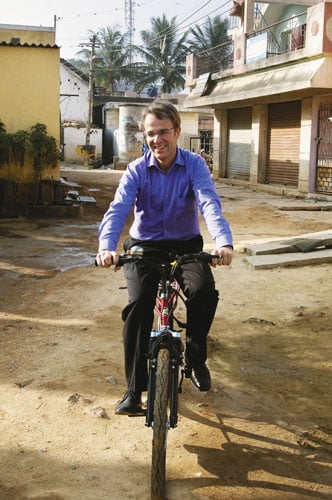
“India is Not a Country Made for Everyone”
In his 10 years in India, SAP Labs’ Clas Neumann has learnt how to conduct meetings and expectations, and not take things personally
I first came to India when I was 23. I had come as a typical backpacking tourist, and ended up spending two months in the country. This was 20 years ago, and I spent my first night in the Golden Temple in Amritsar. It was a very interesting experience. I was overwhelmed by the over spirituality of the country and its multi-cultural dimensions. It is very different from today where my colleagues spend the first night at an Oberoi or a Taj — there is a huge difference in the way you experience the country.
Now I’m 42, and my family and I have spent 10 years in the country. Two of my three children were born here, and although I came with a two-year contract, we would keep renewing it because my family adjusted very well.
The truth is, the longer you stay away from your home country, the less it is your home country. For our children this is their home country. This is where they were born, two of them at least, and this is where they go to school, their friends are here and they get their education.
When I had come as a student, I learned cultures could be so different, so when I had to come on work, I was a bit anxious about what the work culture was like. I was coming to look after the HR and financial perspectives for SAP Labs while retaining the local flavour. I enrolled myself in an inter-cultural seminar, and I learned the usual things like the correct way of greeting and etiquette. But I learned more about how to conduct meetings, expectations, and I learned not to take things personally.
I found this out well in my first meeting I did here with my own little management team at that time. I said let’s start at 9 a.m. I was in the room at 9 a.m. and nobody else was there. Then at 9:05 a.m. the first guy walks in and says, “Hi Clas, nice to meet you,” with no apologies for being late. By 9:20 a.m. we were complete and still chatting. In Germany the meeting would have been over by then and my boss actually would have left the room if no one appeared on time. But this is not meant as a sign of disrespect. People from my culture would easily see this as disrespect — if you’re not on time you’re not respecting my time, and it would be taken as an insult to the person you are meeting.
As recently as a month ago, I saw my incoming German colleagues who were very worried looking at how preparations were going for our TechEd conference. One day before the conference, my colleagues said, “They will never finish. Look at what state this is in, and they haven’t even put up the backdrop!” And I was thinking, “They still have one night to work.” So I said: “Relax guys, it’s just the way things go, and I can tell you it’s going to be okay by the end of the day. Tomorrow 9 a.m. it will be finished.” The next day at 8:59 a.m., it was all done and so you have to be very trustful, but usually it works.
My experience in India has taught me to focus on people issues over process issues. We go to a certain extent with colleagues, which we would not do in Germany. For example, there was this one incident where two colleagues fell in love, and their families did not agree and it was very tense. We sent them to Germany on assignment to get them out of the tension zone, so they could rethink things and communicate with their families from a different perspective. In Germany, people would not even approach the company with things like this. What I have found is, this creates a strong loyalty within the employee, and I hope, of course, if the company goes an extra mile, the next occasion the employee may go an extra mile for us.
In India you need to be flexible to deal with issues. There is no one-fix for every problem. I would, however, like it if young people in India take the time out to travel. Travelling helps as you see the world with different eyes. You often get caught up in the process of getting good degrees and getting a good job because of family, society, and a financial situation. Whereas, in Germany, we have more freedom to tell our parents that we want to take a year off after our studies.
But this competitiveness in the education system did get to me. A couple of years ago I saw so many of my engineers do their MBA and they came back knowing more than me, so I became a little competitive. I did an executive MBA from INSEAD; in Germany I would have never done this. Ten years after you start working, you would never take time during your career to pursue any sort of studies, as it puts a lot of stress on your family, and your job.
India, as I have learned, is not a country made for everyone, and from the outside it looks difficult so you don’t have many more people who come. You always have more people wanting to go out than come in and that should change. It is something I would like to encourage a little more.
(This story appears in the 30 November, -0001 issue of Forbes India. To visit our Archives, click here.)





